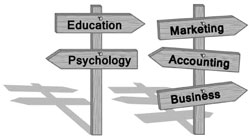Many debate whether or not having a college major plays a significant role in determining a person’s future career, although this is generally the number one question that students are asked.
Choosing a major has become an increasingly daunting task for college students, especially when it is believed to dictate their lifelong profession. In today’s competitive job market, many students are conflicted between choosing a major they are genuinely interested in and choosing one that will offer the most lucrative job opportunities once they graduate.
Alyssa Riley, a sophomore accounting major, said, “When I first started college, I had wanted to be an art major but everyone’s reactions when I told them my potential plan kind of discouraged me. All I heard in response was ‘How are you going to find a job?'”
Because of this uncertainty, students like Riley often choose to postpone their major decision. Approximately 50 percent of incoming University students enroll as undeclared each year, according to data from the University’s website.
Danielle Schrama, Director of Advising, said, “I think a lot of times students have an idea of what they want to do but just don’t want to commit and be confined by it. If they do end up committing early on they often change their mind and switch, sometimes even more than once.”
However, despite the concerns of students, many professionals are trying to debunk the myth that the career you will have for the rest of your life is directly related to your college major.
William Hill, Assistant Dean for Career Services, said, “Most of the employers from job fairs and other career-related events held on campus are not looking for prospective employees to have a particular major. They want someone who is well-rounded with good communication skills, problem solving and analytical abilities.”
According to the United States Census Bureau statistics, only about 30 percent of Americans earned a bachelor’s degree. This gives anyone with a four-year degree an edge in the job market, regardless of major, given that they are in the minority as far as education.
“Liberal arts majors have so much opportunity in the market because the skills they learn are transferable,” said Hill, who oversees the operations of career services. “Also, if a student gets a job out of college that they aren’t satisfied with, they shouldn’t panic. This generation is much more mobile in the job market and they have plenty of time to gain experience and change paths along the way.”
While a college major may be flexible and allow students to diverge into various different fields of study, there is also a negative side to being unsure about what to declare. For certain fields, such as more technical occupations, a student’s college major directly correlates to their career. By being undecided or by switching majors during the year, they may face setbacks later on.
Schrama, who supervises advising, said, “Being undecided may put you at a disadvantage if you end up choosing a structured major that has a very strict sequence. You may have to take summer classes or 18 credit semesters to catch up.”
Careers such as nursing or education, for example, require a very specific amount and type of courses. “If you want to go to graduate school for something in particular, there are going to be certain prerequisites that are required so it is important to have a plan early on and choose a major that will fulfill these requirements,” said Schrama.
However, there are still options available to those students who are not entirely sure about their major.
Career Services suggests that students talk to various professors and recent graduates who have experience in the job market in order to gain some insight to help them make an informed decision.
Nicolette Kontor was an in international relations major at The College of New Jersey but is now working in human resources and marketing for a software company called FAST. In an online interview she said, “My major helped me to be more analytical, perceptive, and sensitive to other cultures, which are skills I have applied to my work here, but I still feel a specialized ‘practical’ or ‘technical’ degree would be much more useful for college students in today’s job market.”
According to the 2011 graduate, a connection between what you learn in college and the job you have post-graduation is essential. “While I learned what I do here at FAST through experience and the help of my managers and coworkers, knowing the basics when I started could have saved a lot of time, effort, and uncertainty, and I would have been more valuable from the get-go,” she said.
Ultimately, however, this decision is dependent on each student’s unique and specific situation. The University provides a multitude of services that help students get the necessary information to choose a major that suits them best. Monmouth advising recommends that students take an online career test called FOCUS which matches students to compatible careers based on their characteristics, attend career fairs, and enroll in different introductory classes to have a better understanding of each field of study. In addition, the school offers one-on-one undeclared counseling as a resource for undecided students.
PHOTO TAKEN from collegemajors.com


